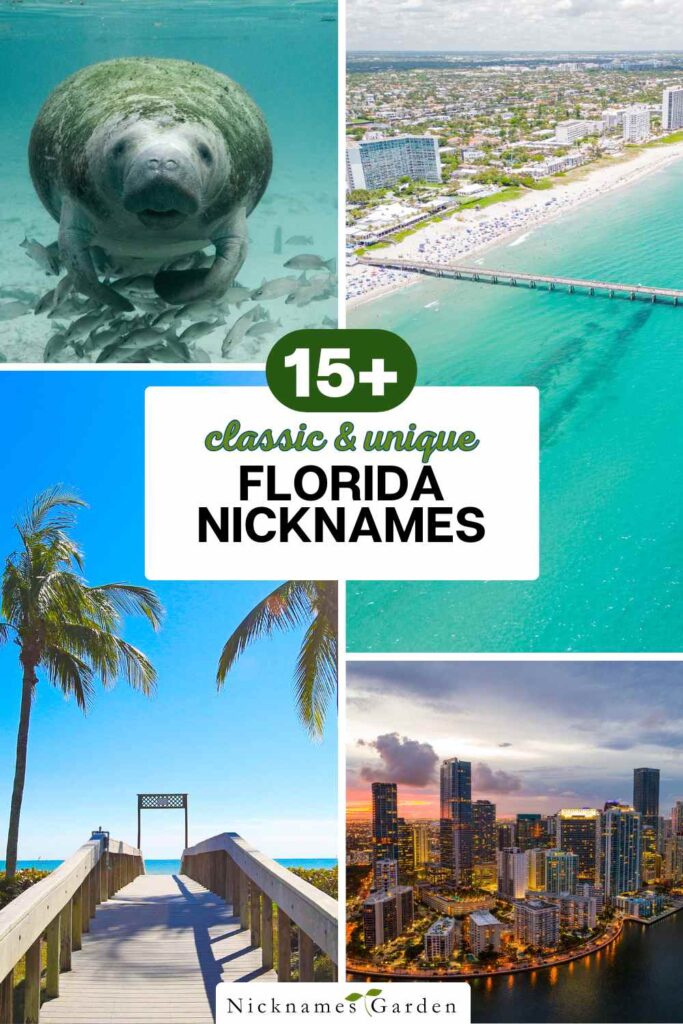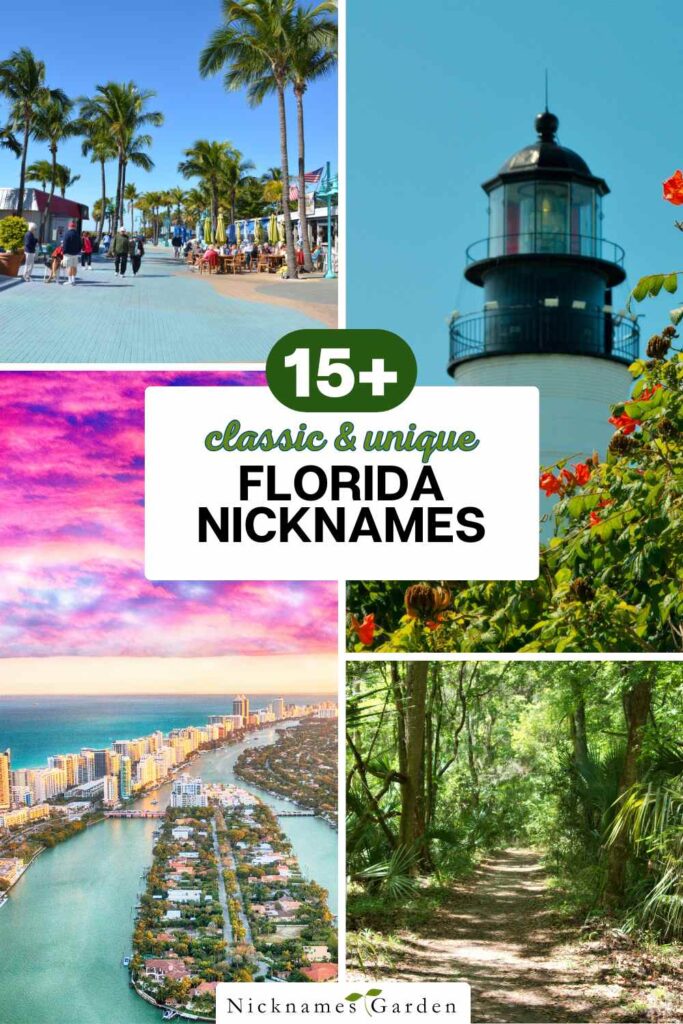Florida, known for its diverse culture and vibrant history, boasts a rich collection of nicknames.
This guide explores the origins and meanings of these names, offering insight into the unique identity of the Sunshine State.
Statewide Nicknames
The Sunshine State
Meaning and Origin
- Florida’s most popular nickname, “The Sunshine State,” reflects its beautiful weather and abundance of sunny days.
- The nickname was officially adopted in 1970, although it had been in use informally long before that.
Historical Context and Usage
- Florida’s warm climate and sunny skies have made it a popular destination for tourists and retirees.
- The nickname has been widely used in tourism campaigns, on license plates, and in state branding.
The Peninsula State
Geographical Significance
- Florida is a peninsula, surrounded by water on three sides: the Gulf of Mexico to the west, the Atlantic Ocean to the east, and the Straits of Florida to the south.
- This unique geography contributes to the state’s diverse ecosystems and climates.
Usage in Literature and Media
- The term “Peninsula State” is often used in educational contexts and geographical descriptions.
- It highlights Florida’s distinctive shape and coastal features, which are central to its identity.
The Alligator State
Wildlife Significance
- Florida is home to a large population of American alligators, particularly in the Everglades and other wetlands.
- The presence of these iconic reptiles has earned the state its nickname, “The Alligator State.”
Historical and Cultural Context
- Alligators have been a symbol of Florida’s wild and untamed nature for centuries.
- The nickname is used in various cultural references, from sports teams (like the University of Florida Gators) to local businesses and attractions.
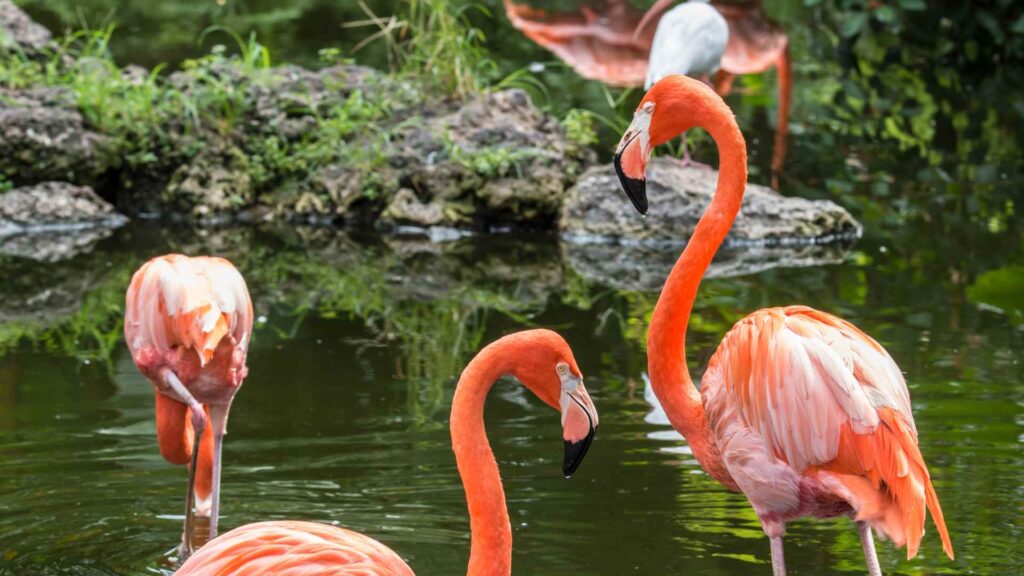
Regional Nicknames
South Florida
Magic City (Miami)
- Origin of the Nickname: Miami earned the nickname “Magic City” in the early 20th century due to its rapid growth. From a small settlement, it blossomed into a bustling metropolis almost overnight.
- Cultural and Historical Significance: The nickname reflects Miami’s dynamic and vibrant character, its diverse population, and its status as a major cultural and economic hub in Florida.
The Venice of America (Fort Lauderdale)
- Meaning and Origin: Fort Lauderdale is known as “The Venice of America” because of its extensive and intricate canal system, reminiscent of Venice, Italy.
- Impact on Tourism and Local Culture: The nickname highlights the city’s unique charm and attractiveness as a premier boating destination, influencing its tourism industry and lifestyle.
Central Florida
The Theme Park Capital of the World (Orlando)
- Origin and Significance: Orlando’s moniker stems from its world-renowned theme parks, including Walt Disney World, Universal Studios, and SeaWorld.
- Influence on Tourism and Economy: This nickname underscores Orlando’s global reputation as a major tourist destination, significantly contributing to the local and state economy.
The City Beautiful (Orlando)
- Meaning and Origin: “The City Beautiful” is a nickname adopted in the early 20th century as part of a citywide beautification campaign aimed at enhancing Orlando’s aesthetic appeal.
- Cultural Impact: The nickname is a source of local pride and reflects the city’s ongoing commitment to maintaining its scenic beauty and high quality of life.
North Florida
The First Coast (Jacksonville)
- Historical Significance: The term “First Coast” refers to the northeastern part of Florida, where Europeans first settled in what would become the United States.
- Usage in Tourism and Media: The nickname is used to promote the region’s rich history and its role as the gateway to Florida’s historical attractions.
Bold New City of the South (Jacksonville)
- Meaning and Origin: This nickname was coined in the 1960s to signify Jacksonville’s ambitious urban renewal projects and its emergence as a modern southern city.
- Cultural and Economic Impact: The nickname reflects the city’s progressive spirit and economic growth, fostering a sense of pride among residents.
The Panhandle
Redneck Riviera (Panama City Beach)
- Origin and Meaning: “Redneck Riviera” is a colloquial term for the stretch of Gulf Coast beaches in the Florida Panhandle, known for its laid-back, southern charm.
- Cultural and Economic Impact: While the nickname is used humorously, it highlights the region’s popularity among tourists seeking a relaxed beach experience and contributes to its unique identity.
The Forgotten Coast
- Historical and Cultural Context: This nickname refers to a largely undeveloped and less commercialized stretch of coastline in the Panhandle, encompassing areas like Apalachicola and St. George Island.
- Impact on Local Communities and Tourism: The nickname emphasizes the region’s unspoiled natural beauty and tranquility, attracting tourists seeking a more serene and authentic experience.
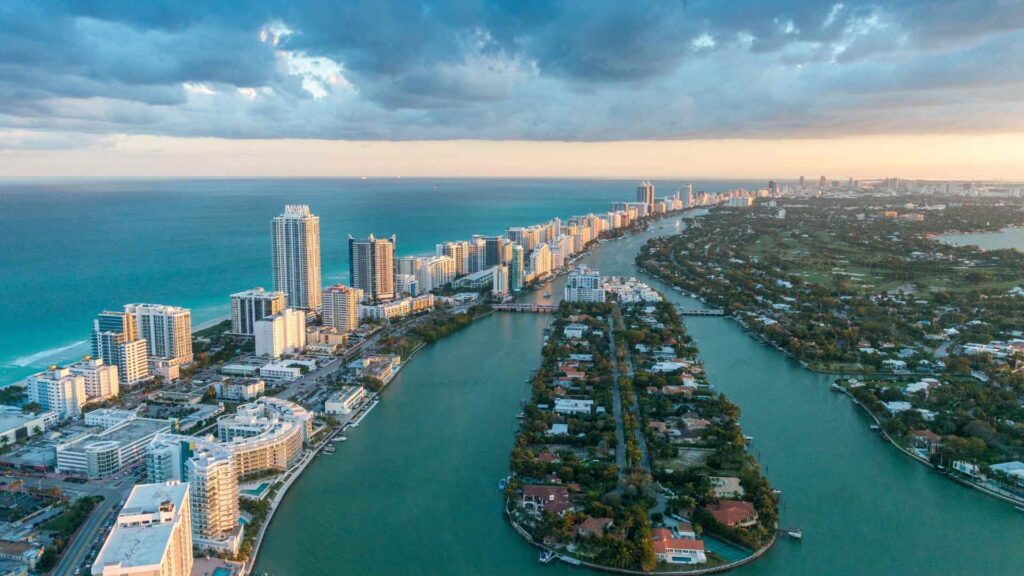
Nicknames for Natural Features
The River of Grass (Everglades)
Origin and Meaning
- The Everglades is often called “The River of Grass” due to its vast expanse of sawgrass marshes that flow like a river from Lake Okeechobee to Florida Bay.
- This nickname was popularized by Marjory Stoneman Douglas in her 1947 book, “The Everglades: River of Grass.”
Environmental and Cultural Significance
- The nickname highlights the unique ecosystem of the Everglades, which is home to a wide variety of wildlife, including alligators, panthers, and numerous bird species.
- It underscores the importance of conservation efforts to protect this vital and fragile environment.
Emerald Coast
Origin and Significance
- The term “Emerald Coast” refers to the stretch of coastline along the Florida Panhandle, particularly around Destin, Fort Walton Beach, and Okaloosa Island.
- The nickname comes from the area’s stunningly clear, green waters and white sandy beaches.
Tourism and Local Culture
- The Emerald Coast is a major tourist destination, known for its beautiful beaches, fishing, and outdoor recreational activities.
- The nickname is used extensively in marketing and tourism promotions to attract visitors seeking a picturesque beach vacation.
Historical Context and Origin
- Cape Canaveral and its surrounding areas are known as the “Space Coast” due to their significant role in the U.S. space program. The nickname dates back to the 1960s when NASA launched its missions from this region.
- The Space Coast includes the Kennedy Space Center, where many historic spaceflights, including the Apollo moon landings, were launched.
Impact on Local Identity and Tourism
- The Space Coast nickname reflects the region’s importance in space exploration and its ongoing contributions to space science and technology.
- It has become a key aspect of local identity, with numerous attractions, museums, and events celebrating the area’s space heritage. This has a substantial impact on tourism, drawing visitors from around the world to learn about and experience the history of space exploration.
City-Specific Nicknames
Tampa Bay Area
Cigar City (Tampa)
- Origin and Historical Significance: Tampa earned the nickname “Cigar City” in the late 19th and early 20th centuries when it became the cigar manufacturing capital of the world. Immigrants from Cuba, Spain, and Italy established cigar factories, particularly in the Ybor City neighborhood.
- Cultural Impact and Modern Usage: The nickname reflects Tampa’s rich cultural heritage and its historical significance in the cigar industry. Today, it is celebrated through festivals, museums, and local businesses, preserving the city’s unique identity.
The Big Guava (Tampa)
- Origin and Meaning: The nickname “The Big Guava” was coined by journalist Steve Otto in the 1970s as a playful nod to New York City’s “Big Apple” moniker. It references Tampa’s tropical climate and its agricultural history.
- Cultural and Economic Impact: The Big Guava nickname captures Tampa’s vibrant and quirky character. It has been embraced by locals and used in various cultural references, from festivals to local merchandise.
Florida Keys
Conch Republic (Key West)
- Historical Context and Origin: In 1982, Key West declared itself the “Conch Republic” in a mock secession from the United States to protest a Border Patrol roadblock that was hurting tourism. The declaration was symbolic, but it garnered significant media attention.
- Cultural Significance and Modern Usage: The Conch Republic nickname represents Key West’s independent spirit and unique identity. It is celebrated annually with a festival and is a point of pride for residents and a draw for tourists.
The Southernmost City (Key West)
- Geographical Significance: Key West is the southernmost city in the contiguous United States, located just 90 miles north of Cuba.
- Tourism and Local Culture: The Southernmost City nickname is a major attraction for tourists, who flock to Key West to visit landmarks like the Southernmost Point buoy. It is central to the city’s marketing and identity.
Orlando
O-Town (Orlando)
- Origin and Meaning: “O-Town” is a popular nickname for Orlando, derived from the initial “O” in Orlando. It is a simple, catchy moniker that locals and visitors alike use.
- Cultural Impact: The nickname is commonly used in music, media, and by sports teams, contributing to the city’s contemporary and youthful image.
The Beautiful City (Orlando)
- Meaning and Origin: Similar to “The City Beautiful,” this nickname emphasizes Orlando’s commitment to urban beautification and high quality of life. It highlights the city’s efforts to maintain attractive public spaces and a clean environment.
- Cultural Impact: The Beautiful City nickname is a point of pride for residents and reinforces Orlando’s reputation as a pleasant and aesthetically pleasing place to live and visit.
Jacksonville
The Bold New City of the South (Jacksonville)
- Meaning and Origin: Coined in the 1960s, this nickname was part of an urban renewal campaign aimed at modernizing Jacksonville and attracting new businesses and residents.
- Cultural and Economic Impact: The nickname reflects Jacksonville’s progressive spirit and its growth into a major economic hub in the southeastern United States. It is used in promotional materials and civic branding.
Jax (Jacksonville)
- Origin and Meaning: “Jax” is a common abbreviation for Jacksonville, used informally by locals.
- Cultural Impact: The nickname is widely recognized and embraced, appearing in the names of local businesses, sports teams, and media. It adds a casual and approachable element to the city’s identity.

Sports-Related Nicknames
The Swamp (University of Florida)
Origin and Significance
- The nickname “The Swamp” refers to Ben Hill Griffin Stadium, the home of the University of Florida Gators football team. It was coined by former Gators coach Steve Spurrier in the early 1990s.
- Spurrier famously said, “The Swamp is where Gators live. We feel comfortable there, but we hope our opponents feel tentative. A swamp is hot and sticky and can be dangerous.”
Impact on Sports Culture and Local Identity
- The Swamp nickname has become synonymous with the intimidating atmosphere of Gators’ home games. The stadium is known for its loud and passionate fans, creating a challenging environment for visiting teams.
- It is a point of pride for Gators fans and contributes significantly to the University of Florida’s sports culture and identity.
Titletown (Gainesville)
Meaning and Origin
- Gainesville earned the nickname “Titletown” due to the University of Florida’s success in various sports, particularly football and basketball, where the Gators have won multiple national championships.
- The term gained popularity in the mid-2000s when the Gators won both the NCAA basketball championship and the BCS football championship in the same year (2006-2007).
Influence on Local and National Sports Culture
- Titletown celebrates Gainesville’s rich tradition of athletic excellence and the University of Florida’s dominance in collegiate sports.
- The nickname is a source of immense pride for students, alumni, and residents, bolstering the city’s reputation on a national level.
The Lightning Capital of the World (Tampa Bay Lightning)
Origin and Significance
- Tampa Bay Lightning, the city’s professional hockey team, adopted the nickname “The Lightning Capital of the World” due to the frequent lightning storms in the Tampa Bay area.
- The name reflects both the natural phenomenon and the team’s fast-paced, electrifying style of play.
Cultural Impact and Fan Engagement
- The nickname enhances the team’s identity and branding, connecting it with a distinctive aspect of the local climate.
- It has been embraced by fans and is often used in marketing and promotional materials, fostering a strong sense of community and team spirit.
The Jags (Jacksonville Jaguars)
Origin and Meaning
- “The Jags” is a shorthand nickname for the Jacksonville Jaguars, the city’s NFL team. It is a casual and affectionate term used by fans and media.
- The nickname reflects a sense of familiarity and loyalty among supporters.
Cultural Impact
- The Jags nickname is integral to the team’s identity and is prominently featured in merchandise, fan chants, and local media.
- It fosters a strong connection between the team and the Jacksonville community, enhancing local pride and support for the Jaguars.
Cultural and Historical Nicknames
The City of Five Flags (Pensacola)
Historical Context and Origin
- Pensacola is known as “The City of Five Flags” because it has been governed by five different nations throughout its history: Spain, France, Great Britain, the Confederate States of America, and the United States.
- This nickname reflects Pensacola’s rich and diverse colonial history, dating back to its founding in 1559 by Spanish explorer Tristan de Luna.
Cultural Significance and Modern Usage
- The nickname is celebrated through various local events, such as the Fiesta of Five Flags, which commemorates Pensacola’s unique heritage.
- It is a point of pride for residents and is used extensively in tourism marketing to highlight the city’s historical importance.
The Ancient City (St. Augustine)
Historical Significance and Origin
- St. Augustine, founded in 1565 by Spanish explorers, is the oldest continuously inhabited European-established settlement in the continental United States.
- The nickname “The Ancient City” underscores its long history and well-preserved historic sites.
Impact on Local Culture and Tourism
- The Ancient City nickname attracts tourists interested in history and archaeology. Key attractions include the Castillo de San Marcos, the Fountain of Youth, and numerous other historic landmarks.
- It reinforces St. Augustine’s identity as a place where history comes alive, contributing significantly to the local economy and cultural landscape.
The Magic City (Miami)
Origin and Historical Significance
- Miami earned the nickname “The Magic City” in the early 20th century due to its rapid growth. From a small settlement, it blossomed into a bustling metropolis almost overnight.
- The nickname captures the city’s dynamic and vibrant character, reflecting its continuous development and transformation.
Cultural Impact and Modern Usage
- The Magic City nickname is widely recognized and used in various cultural references, from music and film to local businesses and sports teams.
- It highlights Miami’s diverse population and its status as a major cultural and economic hub in Florida.
The River City (Jacksonville)
Geographical Significance
- Jacksonville is often called “The River City” because it is bisected by the St. Johns River, one of the few rivers in the United States that flows north.
- The river plays a crucial role in the city’s economy, providing a natural harbor and supporting maritime industries.
Cultural and Historical Context
- The River City nickname emphasizes Jacksonville’s relationship with the St. Johns River, highlighting its importance in the city’s history, culture, and development.
- It is used in marketing and branding efforts to promote Jacksonville’s scenic waterfront and recreational opportunities.
The Capital City (Tallahassee)
Political Significance
- Tallahassee is known as “The Capital City” because it is the capital of Florida. The city was chosen as the capital in 1824, midway between the population centers of Pensacola and St. Augustine.
- The nickname underscores Tallahassee’s role as the political and administrative center of the state.
Cultural and Historical Context
- The Capital City nickname reflects Tallahassee’s importance in state governance and its rich political history.
- It is used in tourism and marketing to highlight the city’s historical landmarks, such as the Florida State Capitol, the Governor’s Mansion, and various museums and historic sites.
The Red Hills Region (Tallahassee)
Geographical and Environmental Significance
- The “Red Hills Region” refers to the area around Tallahassee known for its distinctive red clay soil and rolling hills.
- This region is characterized by its rich biodiversity and scenic landscapes, which are uncommon in other parts of Florida.
Cultural Impact
- The Red Hills nickname emphasizes the natural beauty and unique environmental features of the Tallahassee area.
- It is used to promote local outdoor activities, such as hiking, bird watching, and eco-tourism, contributing to the city’s identity as a destination for nature enthusiasts.
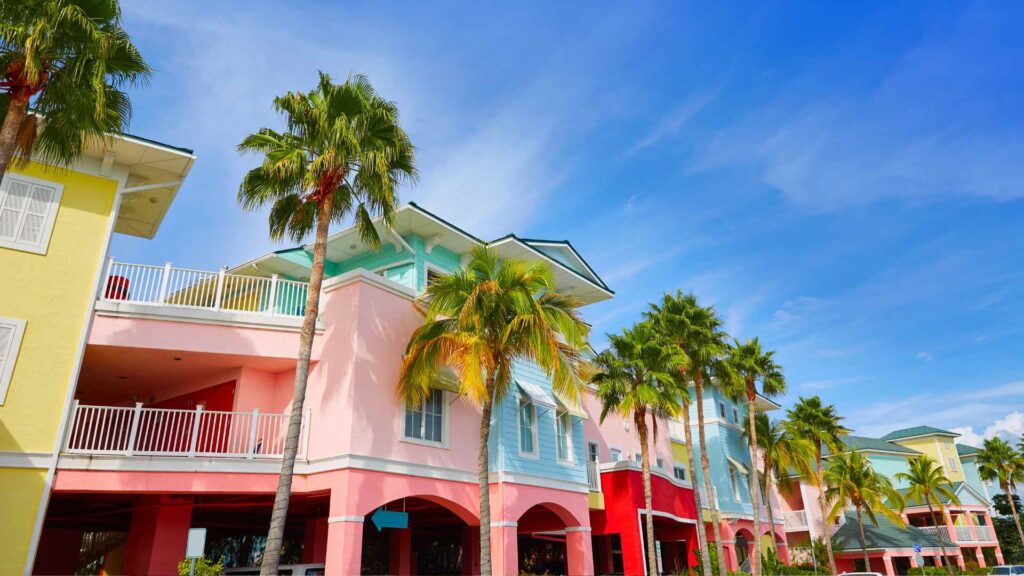
Nicknames Reflecting Florida’s Diversity
The Melting Pot
Cultural Diversity and Significance
- Florida is often referred to as “The Melting Pot” due to its diverse population, which includes people from various ethnic, cultural, and linguistic backgrounds. This diversity is particularly pronounced in cities like Miami, Orlando, and Tampa.
- The nickname underscores Florida’s role as a destination for immigrants from Latin America, the Caribbean, Europe, and beyond, contributing to the state’s rich cultural tapestry.
Historical Context and Modern Implications
- The Melting Pot nickname highlights Florida’s history of immigration and its ongoing status as a multicultural hub.
- It reflects the state’s welcoming atmosphere and the blending of different traditions, cuisines, and languages that shape Florida’s unique cultural identity.
The Retirement State
Origin and Meaning
- Florida has long been known as “The Retirement State” due to its popularity among retirees. The state’s warm climate, tax advantages, and numerous retirement communities make it an attractive destination for older adults.
- The nickname emphasizes the state’s role as a haven for retirees seeking a comfortable and active lifestyle.
Impact on Demographics and Culture
- The influx of retirees has significantly shaped Florida’s demographics, economy, and culture. Retirement communities, healthcare facilities, and leisure activities catering to older adults are prominent features of the state.
- The Retirement State nickname highlights the importance of this demographic group and its influence on Florida’s social and economic landscape.
The Playground of the World
Tourism and Leisure Significance
- Florida is often called “The Playground of the World” due to its wide array of attractions, including theme parks, beaches, golf courses, and resorts.
- The nickname captures the state’s reputation as a premier destination for vacations and recreational activities, appealing to visitors of all ages.
Cultural and Economic Impact
- The tourism industry is a major driver of Florida’s economy, and the Playground of the World nickname underscores the state’s appeal as a fun and diverse destination.
- It reflects the variety of experiences available in Florida, from the excitement of Orlando’s theme parks to the relaxation of the Florida Keys.
The Fishing Capital of the World
Marine and Coastal Significance
- Florida is known as “The Fishing Capital of the World” due to its abundant and diverse fishing opportunities. The state’s extensive coastline, numerous lakes, and rivers provide ideal conditions for both saltwater and freshwater fishing.
- The nickname highlights Florida’s status as a top destination for anglers, attracting fishing enthusiasts from around the globe.
Economic and Cultural Impact
- Fishing is a vital part of Florida’s economy, supporting tourism, local businesses, and recreational activities.
- The nickname emphasizes the state’s natural resources and its commitment to preserving and promoting sustainable fishing practices.
The Cruise Capital of the World
Maritime Significance
- Florida, particularly Miami and Fort Lauderdale, is often called “The Cruise Capital of the World” due to its prominence in the cruise industry. The state’s ports are some of the busiest in the world, serving as major departure points for cruises to the Caribbean, Mexico, and beyond.
- The nickname reflects Florida’s key role in the global cruise market and its appeal as a gateway to tropical destinations.
Economic and Cultural Impact
- The cruise industry is a significant contributor to Florida’s economy, providing jobs and generating revenue through tourism and related services.
- The Cruise Capital of the World nickname underscores the state’s maritime heritage and its importance as a center for travel and leisure.
The Orange State
Agricultural Significance
- Florida is sometimes referred to as “The Orange State” due to its leading role in citrus production, particularly oranges. The state’s climate and soil conditions are ideal for growing citrus fruits.
- The nickname highlights Florida’s agricultural heritage and its significance in the citrus industry.
Cultural and Economic Impact
- Citrus farming is a major economic activity in Florida, contributing to the state’s economy and providing jobs in agriculture, processing, and distribution.
- The Orange State nickname reflects the cultural importance of citrus fruits in Florida, from orange juice to local festivals celebrating the citrus harvest.
Conclusion
Florida’s rich tapestry of nicknames offers a unique glimpse into the state’s diverse culture, vibrant history, and distinctive natural features.
From the sun-soaked beaches of the “Sunshine State” to the dynamic urban growth symbolized by Miami’s “Magic City,” these monikers encapsulate the essence of Florida’s identity.
